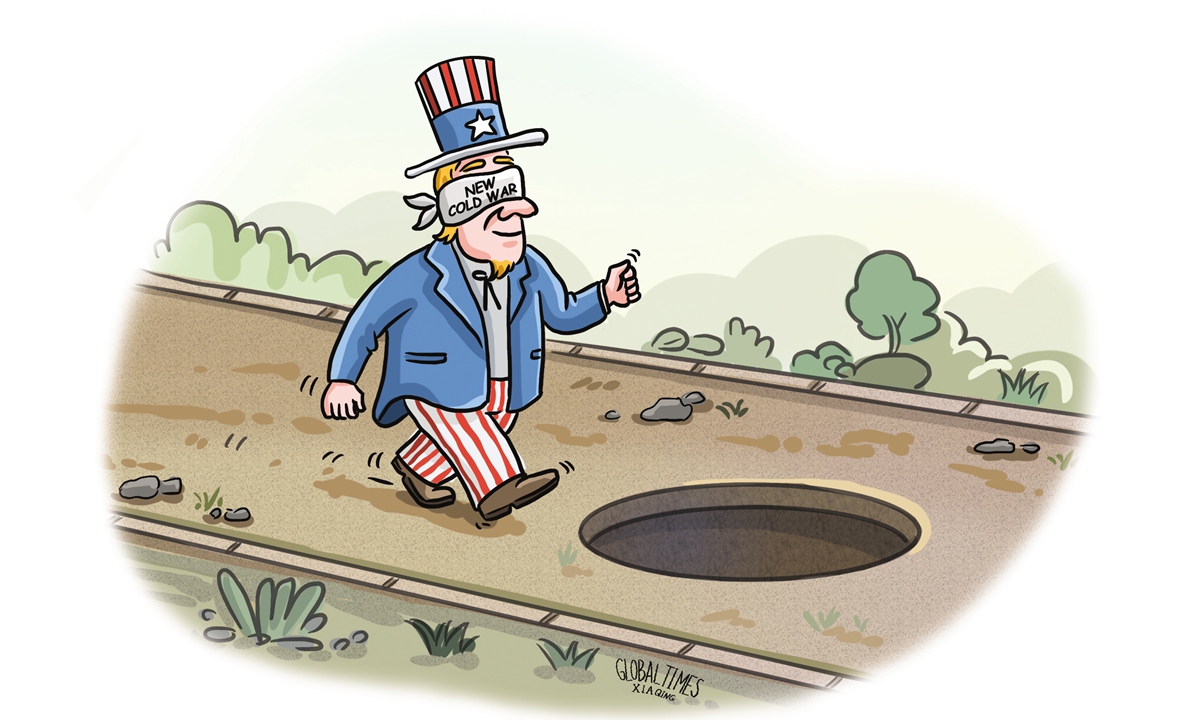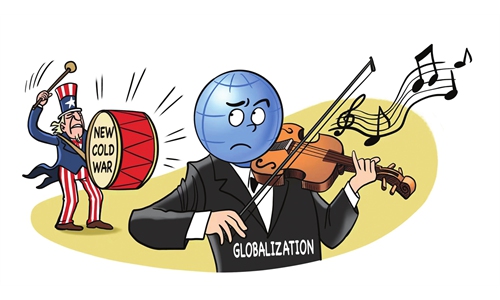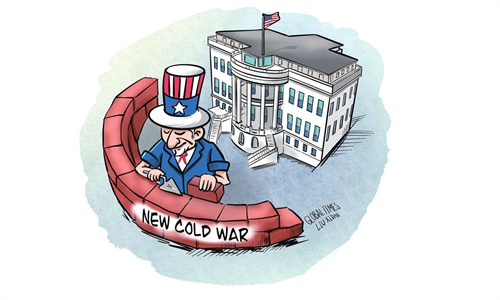
Illustration:Xia Qing/GT
Editor's Note:The China-US bilateral relationship is one of the most important in the world. The trajectory of this relationship has attracted international attention. Still, the US is stepping up its efforts to suppress China on various fronts such as politics and diplomacy, economy, trade, technology, and military security, showing the true meaning of a cold war. The Global Times invites Chinese and foreign experts to expose the US' manipulation of the "new cold war" and reveal the damage it may potentially cause to the world.
This is the third installment of the series.
A couple of years ago, The Transnational Foundation for Peace and Future Research, TFF, in Sweden, of which I am the director, published "Behind The Smokescreen. An Analysis of the West's Destructive China Cold War Agenda And Why It Must Stop."
Among several perspectives of the US/Western accusation industry, we looked into the medialized stories about genocide in Xinjiang, forced labor and Taiwan, and nine mainstream media manipulation methods that aim to manufacture a systematically negative image of China in the Western mind.
We found that a cold war occurs by influencing the "free" press - also the Western state press - through three main mechanisms: a) Fake or fabricated stories, b) Omission - for instance, of every positive aspect of China's developments, and c) Source Ignorance: using the same few sources spreading disinformation, from the US rippling through and being repeated ad nauseam and never checking the root empirical evidence or validity of the assertions, in short, FOSI.
Ultimately, this causes a decay of the crucial and critical role of mainstream media and their conversion toward tabloid banalizing black-and-white worldviews - "we good, them evil" - that promote confrontation and warfare, all operated by the Military-Industrial-Media-Academic Complex, MIMAC.
Tragically for democracy, mainstream media have become the leaders in promoting militarism, armament and legitimizing the empire and its wars. What are the elements of the cold war in all this?
First and foremost, the cold war is a psycho-political phenomenon. It dichotomizes our incredibly complex world into two: good versus evil. It seeks to preserve our superiority and keep others submissive and weaker. It promises war if its deterrence fails. And it precludes a world of equals, cooperation and mutual learning. If you are No. 1 in a system, you do not learn and listen; you teach, bribe and issue orders.
Cold wars may go well for the cold warrior when in ascendancy. In the "old" Cold War in Europe, two fundamentally Western systems - one based on Karl Marx, the other on Adam Smith, to put it crudely - competed while the US/NATO ascended after 1945. On all power scales, it was superior to the Soviet Union and its system. We know how it ended.
The winner then - foolishly - took it all: The US/NATO world did what it pleased within its exceptionalist "international rules-based order," not the UN Charter and other parts of international law. Catchwords: out-of-NATO-area military actions in violation of NATO's own Treaty - Yugoslavia - and regime change/resource/anti-terrorism wars on an assembly line basis; NATO's expansion against all promises given to the Soviet Union.
It all went so well and seemed so easy. Why listen to or empathize with others? Why focus on the changing world when "we" are the change-makers, God's own country par excellence? If we can get away with it, we do it. However, prudence, statesmanship and long-range thinking would have compelled global impact analyses instead of narcissist imperial self-aggrandizement.
It went so well that the West overlooked the Rest: China's impressive socio-economic development based on an eclectic combination of Chinese concepts - that the West still doesn't understand - and imported Western elements; the establishment and maturation of organizations like BRICS, Shanghai Cooperation Organization, and African and other regional organizations.
The West also did not sense the actual price that would be paid for its militarism: It's huge and growing burden on all civilian sectors, including technology and economy, and - in the wake of the history of colonialism and imperialism - the Rest becoming more and more nationally and collectively self-reliant - a concept developed about 50 years ago and ridiculed by the West.
And what was the result? Well, this is written the day after BRICS expanded with essential countries in Africa, the Middle East and South America - a huge step toward a multipolar and cooperative Rest saying: We can do without you, America and Europe! If you want to cooperate on new, reasonable terms, we are ready, but the days of your Western hegemony and universalization of Western values are coming to an end.
Such is global macro history: Empires have come and gone, and that of the US/NATO is the last: Nobody is so naive as to believe that it has a God-given right to be the ruler of the whole world and force others to accept its values.
The enormous world order changing before our very eyes is as predictable as it is inexorable. Only the ignorance - blinding intoxication - of power overlooks it. The West has run its race and become over-extended, insensitive to other cultures and ways of thinking, and unable to adapt to system changes but insisted on steering unilaterally. It's losing legitimacy in the eyes of others, relative economic and political strength and the creative ability to outline a better future world that the Rest feels attracted to: Classical decline indicators!
What I have said here is pure Gandhian thinking: You may harm others by using violence - physical, economic, military, structural, cultural and environmental - but, sooner rather than later, your violence boomerangs: It corrupts, debases, brutalizes and makes you more loathed than loved. A critical mass will develop.
In a deeper socio-cultural sense, the Christian Occident has never appropriately problematized those many types of violence upon which it built its relations with the Rest.
The West's cold war on China is about so much more than the issues that dominate daily news - chips, trade, Taiwan and the topics of the permanent accusation industry. It's about profound tectonic changes in humanity's way of developing - and about whether or not the West will join and contribute or become a de-developed periphery in the new world. And whether its empire will go down with a whimper or a bang, or adapt to macro history's unavoidable changes.
We know very little about humanity's future in the next 100 or so years. The safest philosophy will be for the Rest to, despite all, extend compassion and cooperation to the good forces of the West and abstain from tit-for-tat against its evil ones.
The author is the director of the Sweden-based think tank Transnational Foundation for Peace & Future Research.


